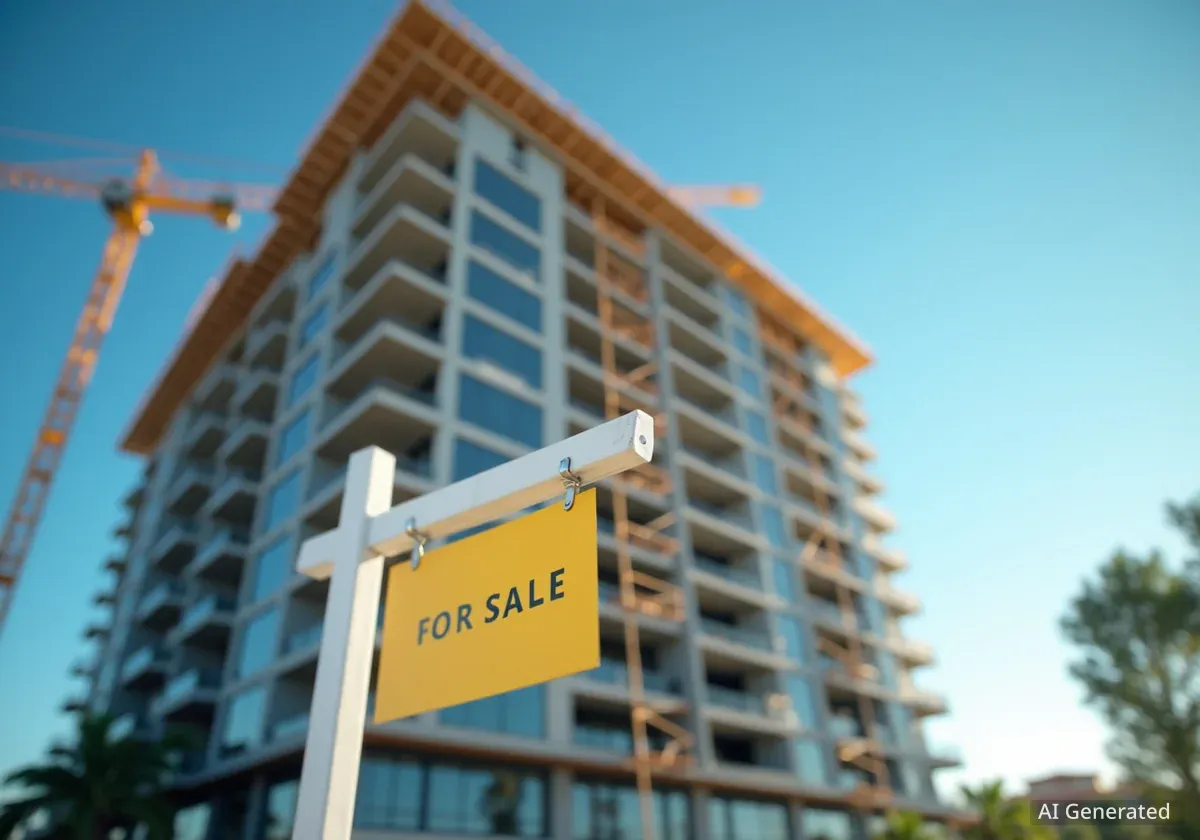Florida's real estate market continues to navigate a complex landscape marked by rising insurance premiums, a severe housing shortage, and new legislative proposals aimed at providing relief. Despite recent reforms, home insurance costs increased by 1.5% in the first eight months of 2025, leaving homeowners questioning when they will see significant cost reductions.
Simultaneously, the state is grappling with a housing supply that has not kept pace with its rapid population growth. This imbalance is driving discussions around new development, property tax relief, and the role of technology in shaping the future of Florida's property and insurance sectors.
Key Takeaways
- Home insurance premiums in Florida rose 1.5% in early 2025, despite legislative reforms intended to lower costs.
- A significant housing shortage persists across the state, attributed to permitting delays and restrictive zoning.
- A new bill proposes $1,000 annual checks for five years to eligible homeowners as property tax relief.
- Miami has been identified by UBS as the top city globally for housing bubble risk for the second consecutive year.
- Lawmakers are now examining the use of artificial intelligence in the insurance industry for processes like claims handling.
The Unrelenting Cost of Home Insurance
Homeowners in Florida have seen their insurance premiums climb yet again, with an average increase of 1.5% recorded over the first eight months of 2025. While this rate of increase is slower than in previous years, it falls short of the relief many had hoped for following major legislative reforms in 2022 and 2023. These reforms were designed to stabilize the market and bring down costs for consumers.
Experts within the insurance industry remain divided on the future of premium prices. Some believe that the market is beginning to stabilize and that price reductions could be on the horizon, while others are more cautious, pointing to ongoing risks and litigation costs that continue to pressure insurers.
Legislators Turn to Artificial Intelligence
In response to the complex challenges in the insurance market, Florida lawmakers have started to investigate the role of artificial intelligence. The House Insurance & Banking Subcommittee recently held discussions with technology and insurance officials about the applications of AI.
According to reports from the meetings, insurers are already using AI for various functions, most notably in claims handling. Industry representatives aimed to reassure lawmakers that the technology is being implemented to improve efficiency and accuracy, while also addressing concerns about potential misuse or biases in automated decision-making.
Statewide Housing Supply and Affordability Crisis
Florida's status as one of the fastest-growing states in the U.S. has created a significant housing deficit. The supply of available homes has not been able to meet the surging demand from new residents, leading to widespread shortages and affordability challenges.
Data analysis points to several root causes for this imbalance. These include lengthy delays in the permitting process for new construction, restrictive local zoning ordinances that limit housing density, and a slow adoption rate for more flexible housing options like duplexes or accessory dwelling units (ADUs).
Florida vs. California: A Tale of Two Markets
A comparison of the coastal housing markets in Florida and California reveals distinct differences. California is characterized by its higher median home prices and a smaller active inventory. In contrast, Florida offers a lower median price point but has a much larger supply of homes for sale and sees more significant price discounts. These dynamics suggest different pressures on buyers and sellers in each state as the year progresses.
A Proposed Solution for Property Tax Burdens
To address the financial strain on homeowners, one state lawmaker has introduced a bill aimed at providing direct property tax relief. State Representative Jeff Holcomb, a Republican from Spring Hill, filed House Bill 71.
"It would start in 2026 and the goal is to have this hit the mailboxes of the homesteaded homeowners who qualify," stated Rep. Holcomb.
The proposed legislation would provide annual checks of $1,000 for five consecutive years. To be eligible, homeowners must have a current taxable property value of at least $100,000 but not exceeding $450,000. The bill is intended to help households struggling with the combined weight of high property taxes and insurance costs.
Development and Risk in South Florida
South Florida, particularly the Miami metropolitan area, remains a focal point of real estate activity and concern. For the second year in a row, the Swiss bank UBS Group has placed Miami at the top of its Global Real Estate Bubble Index.
The report, which evaluates factors like price-to-income ratios and price-to-rent ratios, assigned Miami a score of 1.73. While this is a slight decrease from last year's 1.79, it still indicates a significant risk of a housing bubble. Following Miami on the list were Tokyo and Zurich, with scores of 1.59 and 1.55, respectively.
Florida's Record-Breaking Land Purchase
The state of Florida recently approved one of its most expensive land acquisitions in history. State leaders voted to purchase 4 acres of coastal property in Destin for $83 million. This equates to more than $20 million per acre, highlighting the immense value placed on prime coastal real estate in the state.
Major Redevelopment Projects Emerge
In Fort Lauderdale, a major transformation may be coming to The Galleria Mall. The property's new owners are exploring a massive redevelopment plan that could replace the 1980s-era shopping center. The ambitious vision includes nine towers, each up to 30 stories high, a 170-room hotel, and hundreds of affordable housing units built under the state's Live Local Act.
Further north, a new type of residential community has opened in West Jacksonville. Tampa-based Metro Development Group launched Diamond Springs, a master-planned community that will feature 2,700 single-family homes and townhomes. Its central attraction is a large man-made lagoon, making it Duval County's first "lagoon community."
Emerging Challenges for the Real Estate Industry
The increasing sophistication of technology has introduced new risks for real estate professionals. A recent incident involving a Florida brokerage serves as a stark warning about the dangers of cybercrime.
The brokerage fell victim to an AI-powered fraud scheme that impacted 36 of its agents and their families. This event underscores the vulnerability of the industry to advanced cyber attacks and has prompted calls for heightened cybersecurity awareness. Experts recommend implementing multi-channel verification methods for all communications, especially those involving financial transactions, to prevent similar fraudulent activities.





